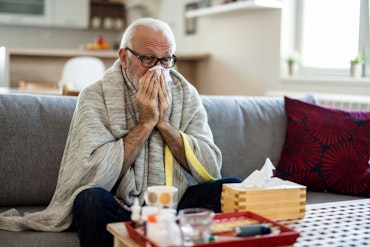Study finds older people at risk of social media misinformation about COVID-19
New research released by Macquarie University shows that older people are likely to be influenced or are more exposed to health misinformation on social media, particularly during stressful events like the COVID-19 pandemic.
![<p>The study found that the main areas where older Australians were misinformed about COVID-19 included the source of the virus, hygiene, and treatment. [Source: iStock]</p>](https://agedcareguide-assets.imgix.net/news/articles/news/articles/misinformation-and-covid19-23_11_2020.jpg?fm=pjpg&format=auto&w=550&q=65)
The study found that the main areas where older Australians were misinformed about COVID-19 included the source of the virus, hygiene, and treatment. [Source: iStock]
The study, Health misinformation on social media during outbreaks: impacts on seniors, investigated older Australians and how they responded to information, whether correct or not, on social media.
The study found that the main areas where older Australians were misinformed about COVID-19 included the source of the virus (denial and conspiracy theories), hygiene (social distancing and vaccination), and treatment (unapproved or dangerous treatments).
Dr Ali Amrollahi, Lecturer and Researcher at Macquarie Business School’s Department of Accounting and Corporate Governance, explains that the study was prompted after hearing news and experiences of older Australians on social media.
“Everyone (including older people) is expected to feel stressed when there is a significant health event, and our normal reaction to a stressful situation is to search for information to cope with our stress,” says Dr Amrollahi.
“If information cannot be found on legitimate sources, some may turn to social media for information and while there is (almost) no fact-checking and editing on social media posts, they may find a lot of misinformation and deceiving instructions.
“Although these platforms have started to remove or put labels on some posts belonging to notable people, they cannot control everything.”
Around 67 percent of older Australians are using social media and 17 percent of all Australians say social media is their primary source of news.
A study, called Belief in Conspiracy Theories, surveyed 1,000 Australians about the social media misinformation they consumed and believed about COVID-19.
Twenty percent of respondents believe the media and Government have exaggerated the COVID-19 deaths to scare the population; 13 percent believe the coronavirus is not dangerous and is actually forcing people to get vaccines; and 12 percent believe that 5G technology is to blame for the source of COVID-19.
Dr Amrollahi explains that social media connects like-minded people, it analyses your connections, interests and online behaviour, and then presents you with content that would be ‘likeable’ by you.
He says that older Australians will likely see posts from people within their network or demographic that they have liked, and then they will receive more of this similar content. This can lead to an individual’s acceptance that this information is correct even if it is fake.
Another issue older people face when using social media is a lack of familiarity with the structure, fact-checking and dissemination of information on social media.
“Moreover, older people are spending less time with their families during lock-down periods and they may spend more time on social media as a result,” says Dr Amrollahi.
Tips for identifying misinformation
Dr Amrollahi’s says there are four tips that older people can use to identify misinformation on social media:
-
Verify the information: If someone shares information on social media, ask them for where they found the information so you can verify it. Be wary of websites that belong to ideologically biased groups and news agencies, particularly those who are promoting conspiracy theories. Double-check information on social media through reputable sources, like the Government websites, World Health Organisation (WHO) or other reputable organisations.
-
Be critical of what you read: Remember that the internet is much bigger than social media. A quick Google search can identify people and their affiliation. Check any information you read is based on credible research and not a personal story or testimony. Additionally, everyone experiences health problems differently, so personal testimony is not a good source of evidence and can be misleading if not balanced by scientific evidence. Dr Amrollahi adds that if a credible piece of news is significant, then it will make its way to public and state-owned media.
-
Exercise caution: Social media use an algorithm to show information to like-minded people, called an online echo chamber. This means there is little chance this information shown to you will be verified by people outside your bubble. If your family members from different demographics or viewpoints have not seen the same information, this could be a reason to believe this information may not be trustworthy.
-
Ask an expert: No one can replace an expert, especially if your health is involved. Talk to a health professional for advice before believing health advice from social media.
Dr Amrollahi says the study aims to inform Australian seniors that there is misinformation out there that can be deadly and teach older people how to avoid misinformation on social media.
To read more about the research, head to the Macquarie University website.











![The new Aged Care Act exposure draft is slated for release in December of 2023, but advocates hope to see it rolled out on January 1, 2024. [Source: Shutterstock]](https://agedcareguide-assets.imgix.net/news/articles/wp/agedcareact__0811.jpg?fm=pjpg&w=520&format=auto&q=65)












Comments